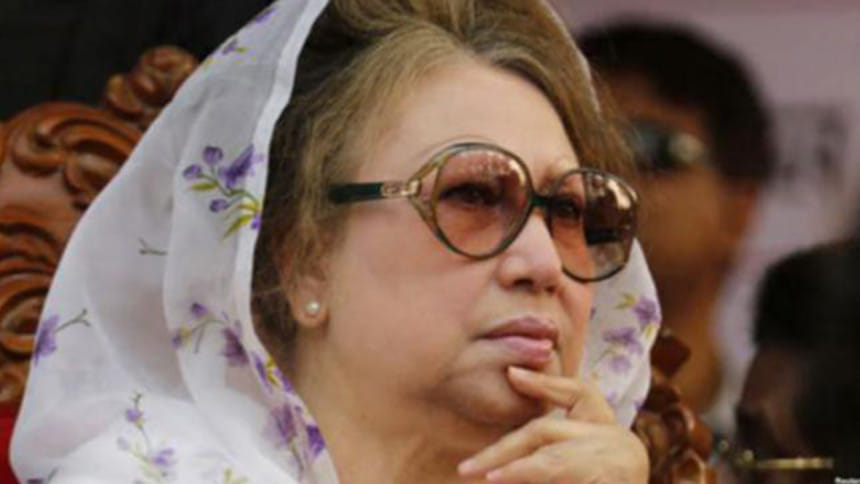Zia Orphanage Trust Case: Graft danger to good governance

Corruption threatens the foundation of democracy, social justice and rule of law, High Court has observed in its full verdict in Zia Orphanage Trust graft case.
“Today, corruption which includes financial crime also in our country not only poses a grave danger to the concept of good governance, it also threatens the very foundation of the democracy, social justice and the rule of law,” the HC said.
The HC bench of Justice M Enayetur Rahim and Justice Md Mostafizur Rahman yesterday released the full text of the verdict that doubled BNP Chairperson Khaleda Zia's five-year jail term, originally handed down by a lower court last year.
“It is beyond controversy that where corruption begins all rights end. Corruption devalues human rights, chokes development and undermines justice, liberty, equality, fraternity which are the core values of our constitution,” it said.
“Thus, the duty of the court is to work in such a manner to strengthen the fight against corruption. Therefore, there is no scope to take a lenient view in awarding punishment to an accused, against whom the charge has been proved, considering his/her social and/or political position.”
Khaleda, a former prime minister, landed in jail after the Special Court-5 in Dhaka on February 8 last year sentenced her to five years' imprisonment, considering her age and social status. She is now 74.
“Taking the above facts into account we consider it appropriate that justice would be met if the maximum sentence prescribed in section 409 of the Penal Code is awarded to Begum Zia so that the persons enjoying the highest position in any organ or any public office of the State thinks twice to go ahead with such criminal design in coming days,” the HC said.
The lower court awarded five other accused in the case, including her son Tarique Rahman, who is now BNP's acting chairman, 10 years' imprisonment for misappropriating over Tk 2.1 crore that had come from a foreign bank in grants for orphans.
The other convicted accused are Kazi Salimul Haque, an ex-BNP lawmaker from Magura; Sharfuddin Ahmed, a businessman; Mominur Rahman, a cousin of Tarique; and Kamal Uddin Siddique, former principal secretary.
The HC, which delivered its verdict on October 30 last year, upheld the 10 years' jail sentence of Salimul and Sharfuddin. Tarique and two others are on the run.
'KHALEDA ABUSED THE CHAIR OF THE PREMIER'
In its 175-page verdict, the bench said, “Begum Zia had entrustment and dominion over the PM's Orphanage Fund, a public fund, and a huge amount of money of the said fund was disposed of, used and misappropriated dishonestly by Begum Zia with the active aid of other convicts.
“In the instant case Begum Zia is the principal offender and other convicts actively aided and facilitated to commit such offence.”
The court said it was the obligation of Khaleda to secure due and proper use of the fund obtained for the welfare of orphans.
“But in exercise of the highest office of the government, she rather allowed her sons, relative and party men in misdealing the fund with fraudulent intention by creating fake trust.
“She being at the helm of power at the relevant time rather abused the chair of the premier of a country. It was a ruthless blow to the sanctity of state machineries as well.
It derogated the image of the country to the global community, HC said.
“Abusing the highest chair of the government, Begum Zia was not expected to remain mute for years together in securing due and proper use of the fund over which she had entrustment.”
It also said, “Deliberate and culpable inaction on her part appeared as the key part of the criminal design which was intended to deprive the orphans.”
All these cumulatively aggravated the nature and pattern of the offence for which she has been found guilty, the HC added.
'NO ONE IS ABOVE LAW'
The court said it has been attempted, on part of Khaleda, to label the case as politically motivated and thereby moved to exonerate her.
“But from the facts unfolded in evidence it transpires that the prosecution was initiated not on any political ground and Begum Zia has been brought to justice for specific arraignment constituting an offence punishable under the penal law.”
Thus, she does not deserve any exception or immunity by virtue of being in the political opposition, it said.
“We further reiterate that no one is above the law and even a person having potential political identity is not immune from being prosecuted and tried if he or she is arraigned to have committed an offence.”
Political affiliation of an accused does not deserve to be considered, as blanket immunity in arriving at decision as to his or her guilt and culpability, the court said.
The court said facts and circumstances unveiled in evidence tendered by the prosecution led the trial court in arriving at its decision, not the political identity of the accused.
It has also been depicted that during trial Khaleda got all defence rights permitted by law, it said.
“Thus, merely for the reason of political identity of a person prosecuted for an offence punishable under the penal law it cannot be said that she has been brought to justice on political victimization.”
The court added, “It would be a dangerous precedent indeed for the future if any such mere political identity is taken into account in the process of lawful adjudication of a criminal arraignment.”

 For all latest news, follow The Daily Star's Google News channel.
For all latest news, follow The Daily Star's Google News channel. 








Comments